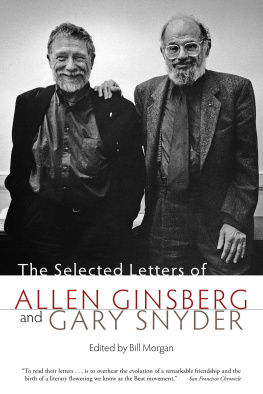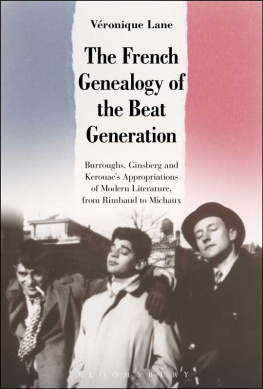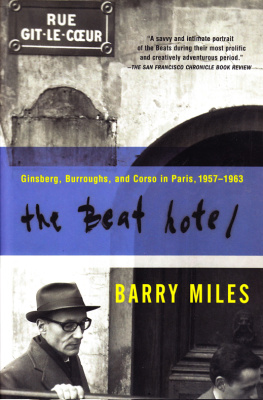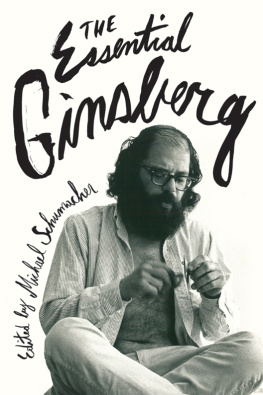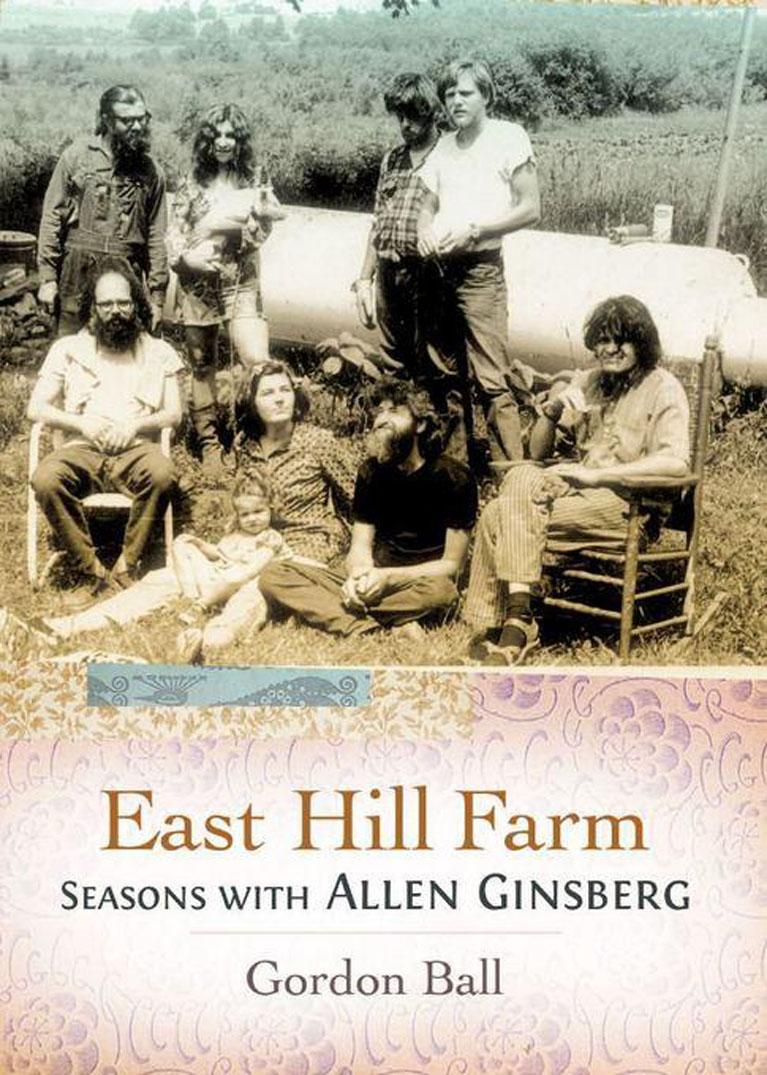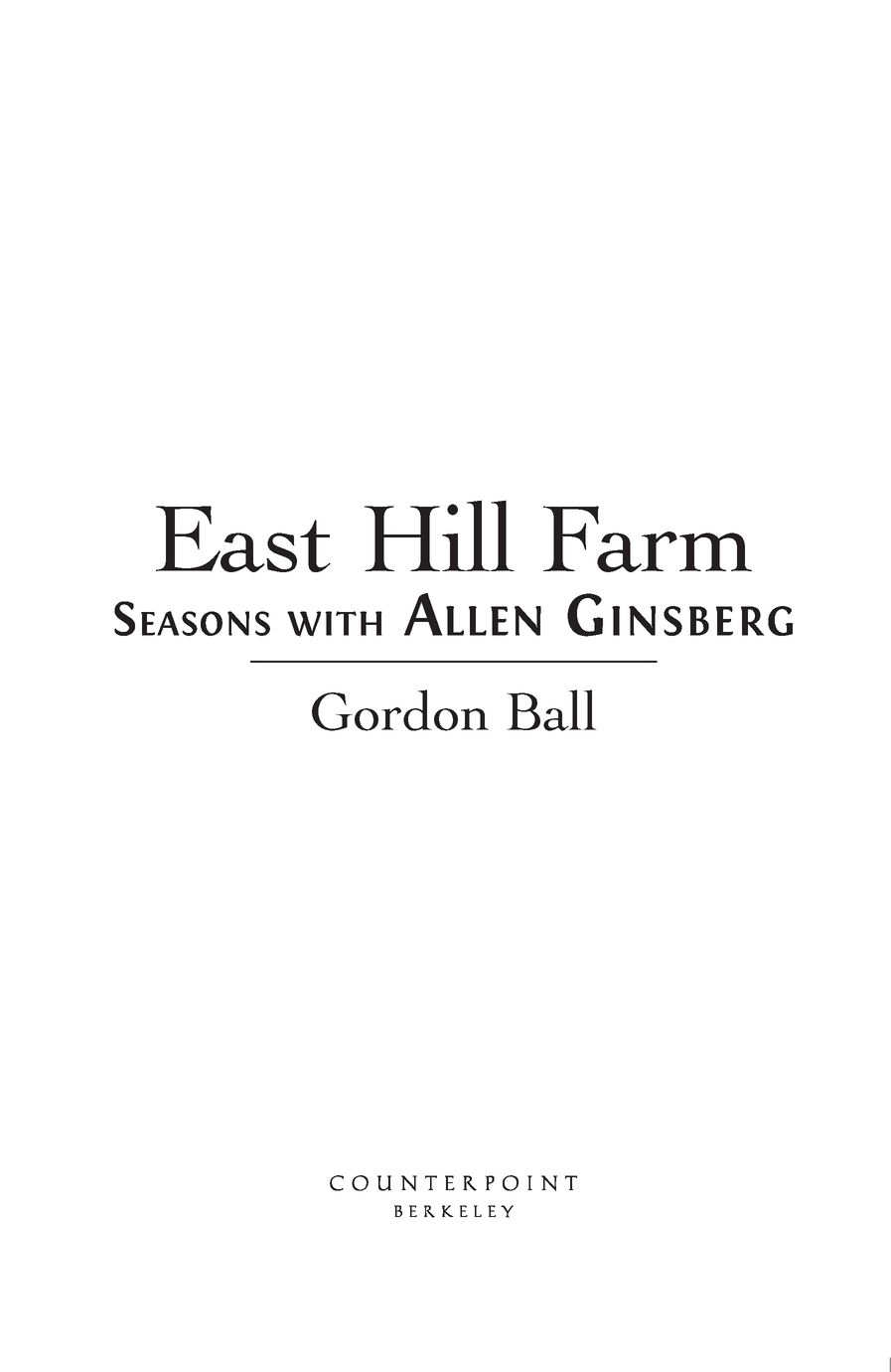Table of Contents
Guide
Table of Contents
To Kathleen
OTHER WORKS BY GORDON BALL:
66 Frames: A Memoir (Coffee House Press)
Dark Music (Cityful Press)
Films by Gordon Ball (DVD)
Films at Canyon Cinema Cooperative (San Francisco),
Filmmakers Cooperative (New York), and Re:Voir (Paris)
Selected Photographs, Ginsberg & Beat Fellows at gordonballgallery.com
Edited with Allen Ginsberg: Allen Verbatim: Lectures on Poetry, Politics,
Consciousness (McGraw-Hill); Journals Early Fifties Early Sixties (Grove);
Journals Mid-Fifties: 1954-1958 (HarperCollins)
THANK YOU
MUCH OF WHAT is good in these pages is due to the generosity of others. I first drafted small sections of this book over a quarter century ago, feeling fortunate to have retained cherished memories, movie footage, diaries, photographs, taperecordings, correspondence, and artifacts from my three years (1968-1971) at Allen Ginsbergs farm five miles from Cherry Valley, New York. But in time intervening Ive become even more fortunate to have the help of a great many people in a great range of ways, and it is thanks to them that this book is now a reality.
My largest debt of all is to my wife Kathleen, who year-in and year-out read or listened to countless drafts, rightly chastising me when my writing was below the mark, yet finding every opportunity to encourage: when I despaired of my book ever seeing print, shed always assure me of its importance. My daughter Daisy mustve wondered at my long hours in the study, or return trips to New York and Cherry Valley and beyond, or spates of long distance calls to people Id not seen for decades, but she seems to have taken it all with some measure of faith, tolerance, and humor. Many years later during final stages of composition she made thoughtful comments.
At the office of the Allen Ginsberg Estate, Peter Hale has been ever helpful, making available needed materials and offering pertinent counsel. Bob Rosenthal, Allens secretary of many years, was always responsive, extending himself by providing information and documents, translating Hebrew, and hosting me in his home and on East Hill.
Among Ginsberg scholars, I offer great thanks to biographers Bill Morgan, Michael Schumacher, and Barry Miles, all of whom have shared valuable material. Bill read with enthusiasm the first long draft of the manuscript years ago, and has gone far beyond friendships call in offering every kind of advice and information ever since. Michael studied a later draft, offered detailed suggestions, and patiently answered my every query. Miles, whom I first befriended on East Hill in 1970, shared his journals with me, and hosted Daisy and me for a week at his home in the south of France, where he offered oral recollections as well. My presentation of several farm and farm-related events wouldve been impossible without his allowing my use of his accounts.
Here at home in Lexington, Virginia, Im especially indebted to two truly generous colleagues in the Department of English and Fine Arts at the Virginia Military Institute: Alan Baragona and John Leland provided sound literary judgment and suggestions for a needy colleague who saw them much more frequently, Im sure, than they ever wished. Alan, like Michael Brickler, Head of Media Services at VMIs Preston Library, was also extremely helpful technologically, including the conversion of photographic prints, some nearly a half-century old, to digital images. My department head Emily Miller was always supportive of my work, as was Peggy Herring. VMIs Research Committee, Faculty Development Committee, and Associate Dean Robert McDonald provided a great range of assistance, including faculty development leave and travel to Cherry Valley and Stanford University. At VMIs Preston Library I wish to thank especially Megan Newman, Cathy Wells, Janet Holly, Tonya Moore, Gwen Sichol, Accacia Flanagan, Brittany Robertson, and Susan Hastings.
A number of people whose lives intersected with mine on East Hill generously added to my store of memories, including Peter Orlovsky, Stephen Bornstein, Bonnie Bremser (Brenda Frazer), Gregory Corso, Edith Ginsberg, Robert Creeley, Carl La Salle, John Giorno, Stella Jane, Judy Cannon (who also hosted me on a return trip), Jon Sholle, Susan Brustman, Lawrence Ferlinghetti, Penny Rand, Nora Crain, Gary Snyder, Charles and Pamela Plymell, Lucien Carr, Wayne Graham, Charlene Graham Talbot, Michael Aldrich, Rosebud Pettet, Eugene and Connie Brooks, Ernie Whiteman, Sidney Goldfarb, Alan Brooks, Patti Ashley, Michael Morris, Drummond Hadley, Preston Faggart, Elsa Dorfman, Ann Charters, Peter Bornstein, Brett Aronowitz, Andy Clausen, Carolyn and Martin Karcher, and Kennett Love.
Film archivist Skip Elsheimer transformed tiny movie frames into digital images with generosity and expertise. I also thank Martee Umberger, John Sinclair, David Padwa, Pamela Badyk Mayo, Bruce Weigl, John Weston, Richard and Lois Shelton, Ed Sanders, Donald Hall, Devora OBrien, Patrick Hinely, Chris Campbell, Itka Brill, Andrew Lampert, Jonas Mekas, Selma Katz, John Tytell, Fredricka Smith, Ellen Gordon, Heather Pawlak, Joyce Johnson, Adrienne and Charles Bodie, Danny Schechter, Michael Horowitz, Ben Schafer, Robert Greenfield, Andrew Schoenfeld, Robert H. Jackson, Toby Mussman, Rusty Ford, Steven Taylor; and the staff at Special Collections, Green Library, Stanford University. Finally, for generous help and guidance at Counterpoint, I thank Luke Gerwe, Julie Pinkerton, Jodi Hammerwold; and Jack Shoemaker, who a year and a half ago proposed that we make a beautiful book together.
ONE
In the Beginning
Out of Mexico
DAYPORTAY? THE STEWARDESS asked the federales. They nodded, turned back down the ramp.
She led Joe and me inside, seated us. No other passengers had boarded the Delta jet. It was March 1968; wed come from two weeks in jail, much of the time no running water or even a mirror for combing or shaving. The stewardess and captain following her were the first Americans wed seen since our incarceration. When the captain reached our seats, he leaned over to tell us, I want you to act like human beings while youre on this plane.
While living in the primitive, idyllic village of Yelapa where sea and mountains and jungle met, Id gone to Puerto Vallarta on the motorized rowboat ferry, along with Joe and others, for supplies to move deeper into the jungle. Just after setting foot in Vallarta, wed been arrested without charge as part of a roundup of two dozen gringo hippies, and had then used all our money sending out for food from jail. Now, after a day of detention and interrogation in Mexico City, we were being deported to San Antonio, Texas.
We had $5 between us. I had no idea of the whereabouts of my lady friend Candy, who on learning Id been busted had taken the ferry and sat in front of the jail all afternoon, waiting for my release or her own arrestand was jailed herself. Shed been shipped out before me; I could only hope she was in New York.
Joe and I were apprehensive about our arrival in San Antonio and didnt know how wed be treated, but as soon as we were conducted to an immigration officer I knew wed be all right. He was a fiftyish slow-talking Southerner, and there wasnt a blink of malice about him.


